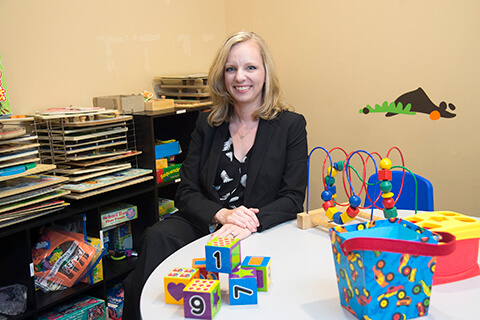August 29, 2017
Purdue Profiles: Mandy Rispoli
 Mandy Rispoli, associate professor of special education and co-director of the Purdue Autism Cluster. (Purdue University photo)
Download image
Mandy Rispoli, associate professor of special education and co-director of the Purdue Autism Cluster. (Purdue University photo)
Download image
When Mandy Rispoli was an undergraduate student at the University of Virginia, she took a part-time job as a behavior therapist for a 4-year-old boy with autism. Although she graduated with double majors in psychology and Spanish, she fell in love with working with the boy and started looking for graduate programs that would allow her to become a special education teacher. She went on to receive her master's in early childhood special education and her doctorate in autism and developmental disabilities from the University of Texas at Austin.
Rispoli came to Purdue in 2016 to work as an associate professor of special education in the College of Education. She serves as the co-director of the Purdue Autism Cluster, where she collaborates with researchers from all over the University and forms interdisciplinary partnerships to further teaching, outreach, and research related to autism. She was selected as the winner of Purdue’s inaugural Trailblazer Mid-Career Faculty Research Award this spring in recognition of her research in the field of special education.
What does your average day look like?
As a working mom, my day is pretty busy. My students and I are usually conducting about two to four research studies at any given time, so much of my day is meeting with students and traveling to our community partner school sites including Cornerstone Autism Center and GLASS Preschool at Linnwood Elementary in Lafayette. I teach in our special education undergraduate, master's and doctoral programs and serve as the Special Education Program Area convener. As a member of the Purdue Autism Cluster, I am involved in local and statewide initiatives and activities related to autism in Indiana.
What does your research focus on?
My research focuses on assessment and treatment of challenging behavior in young children with autism or other developmental disabilities. All young children engage in challenging behavior, which generally doesn’t warrant outside help. However, for children with autism who have limited communication and social interaction skills and who can become easily upset when routines are changed, challenging behavior often emerges as a major issue. We know that challenging behavior is a form of communication, so we can assess the behavior to determine what the child is communicating. Once we know what the child is trying to tell us through their behavior, we can teach a more socially appropriate way for the child to communicate their wants and needs, either through speech, exchanging pictures or the use of speech generating devices.
How did you become interested in research in the field of special education?
As a preschool special education teacher in Texas, I found myself drawn to the children with intense behavioral support needs. Many of those children had autism diagnoses. I developed a program in my school district specifically designed for young children with autism that would enable delivery of intensive, individualized educational and behavioral treatments. The success of the program allowed me to begin traveling around the school district consulting for teachers. The majority of teachers I worked with reported that challenging behavior was the most difficult part of their job and the area in which they felt they had the least preparation. These teachers’ experiences with challenging behavior align with teachers' reports nationally. In fact, challenging behavior is one of the primary reasons why teachers leave the field of education. I quickly realized that while I was impacting the lives of students in my classroom, I could have a much bigger impact on children’s lives by helping to prepare and support their teachers.
You were one of the inaugural Trailblazer Award recipients. How do you hope your teaching and research will empower other teachers?
I am so honored to be the recipient of the Trailblazer Award and grateful for the recognition of my research in functional behavior assessment. I hope that my research is truly applied. That is, I want to ensure that the questions I am asking are questions that are important to teachers and families and that these questions lead to improved outcomes for children with autism.
What is the most rewarding part of your job?
The most rewarding part of my job is integrating research, teaching, and outreach. I love watching my doctoral students transform into independent researchers addressing socially significant issues for children with disabilities. For me, it always comes back to improving the lives of young children with disabilities. Knowing that the research I am doing influences how my students approach their careers, leads to changes in teacher practices, and results in improved outcomes for children with autism is the greatest reward.
Writer: Kelsey Schnieders, kschnied@purdue.edu

